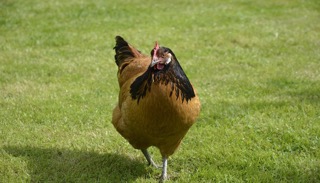How To: Beginners Guide to Backyard Chicken Keeping
How to keep backyard chickens - FAQs
Are you new to keeping chickens? Chickens make great pets, as well as providing freshly laid eggs. And luckily, keeping a few backyard chickens is surprisingly easy!
This handy beginner's guide draws on our years of experience keeping chickens, so you can avoid making the same mistakes we did. Check out our answers to the most common chicken-keeping FAQs from beginning chicken keepers.
What do I need to keep chickens?
You can get all the bells and whistles. You can even get a chicken swing! But all chickens really need to be happy and healthy is:
- A chicken coop or hen house
- A Chicken Feeder
- A Chicken Drinker
- Nesting material such as straw, wood shavings or even shredded paper
- A healthy diet
- Grit
- Access to some grass and dirt
If you live somewhere really cold, your chickens may need protection from ice and snow in the winter.
How much room do chickens need?
Chickens can live in a small coop or hen house, but they are much healthier and happier if they have room to roam. You can let your chickens out to free-range if you have the space (and a well-established garden!). Or you might prefer to build a chicken run or yard onto your hen house.
If you don’t have room for a chicken run, a chicken tractor is a great solution. Chicken tractors have a hen house attached to a small run and can be easily moved around the yard every few days to give birds access to fresh greens and bugs.
How many backyard chickens should I get?
Chickens are social animals. A single chicken will pine and may die of loneliness, so you should always have at least 2 chickens. Never keep one chicken on its own, even if you spend a lot of time with it!
It also isn't good for chickens to be too crowded, so don't get more chickens than you have room for. For a chicken tractor, 2 or 3 chickens are plenty. In large runs or free-range situations, you could have a much larger flock if you wanted to.
Also, chickens don't always lay an egg everyday, so if you are really interested in egg production this will influence how many chickens you get. A good starting point is 1.5 to 2 times as many birds as you would like eggs per day. So if you would like 2 eggs a day, think about getting 3 or 4 birds, depending on which breed you choose.
What breed lays the most eggs?
Different breeds lay more or less eggs.
Modern commercial breeds, such as ISA Browns, lay the most eggs. But they usually have a laying life of 2-3 years, after which they will lay few eggs, if any.
Heritage breed chickens don't lay as productively as modern breeds. But they live longer and keep laying for 4-5 years, so they usually produce more eggs over the long term. Reliable layers include Australorps, which are almost as productive as ISA Browns and Leghorns.
If you cull unproductive chickens, ISA Browns will probably produce more eggs for the amount of feed consumed over their lifetime than heritage breeds. But if you keep your chickens into old age, heritage breeds will continue producing some eggs long after most ISA Browns are just consuming their daily ration.
You can read more about the best egg laying breeds here.
What type of chicken house is best?
Whether a chicken tractor or a traditional hen house is best for you will depend on how much space you have and whether you have fences. Both options are great as long as your birds have:
- Protection from predators, including a solid floor at night if you live in an area with foxes
- Shelter from the elements – hens need to be warm in winter and cool in summer
- Perches to roost on at night
- A nest box to lay eggs in
- Enough space
- Good ventilation
What is the best type of feed for backyard chickens?
Chickens, especially laying hens, should always be fed a complete feed. This means a feed that is scientifically formulated to contain all the vitamins and minerals the birds need. The best feed is a pellet or crumb, not a scratch mix (where you can see all the grains).
Chickens also need grit for their digestion.
You can give your chickens kitchen scraps and weeds as well, but the majority of their diet should be the complete feed, so don’t give them more scraps than they can eat in 20 minutes or so. Learn about the Dos and Don'ts of Scraps for Chickens here.
Do I need a rooster for my hens to lay eggs?
Hens will happily lay eggs whether there is a rooster nearby or not. You definitely don't need a rooster to get eggs. But if you want to hatch chicks, you will need to get a rooster or buy some fertilised eggs.
Roosters can be troublesome. They are also banned in some urban areas, so check your county regulations.
What makes chickens happy?
Chickens will actually purr when they are happy! And if you provide everything they need, your chickens are bound to be happy!
Did we answer your questions about keeping chickens? If we missed something, contact us and we will add it to our guide for new chicken keepers.
Happy chicken keeping!
Rachael at Dine a Chook






